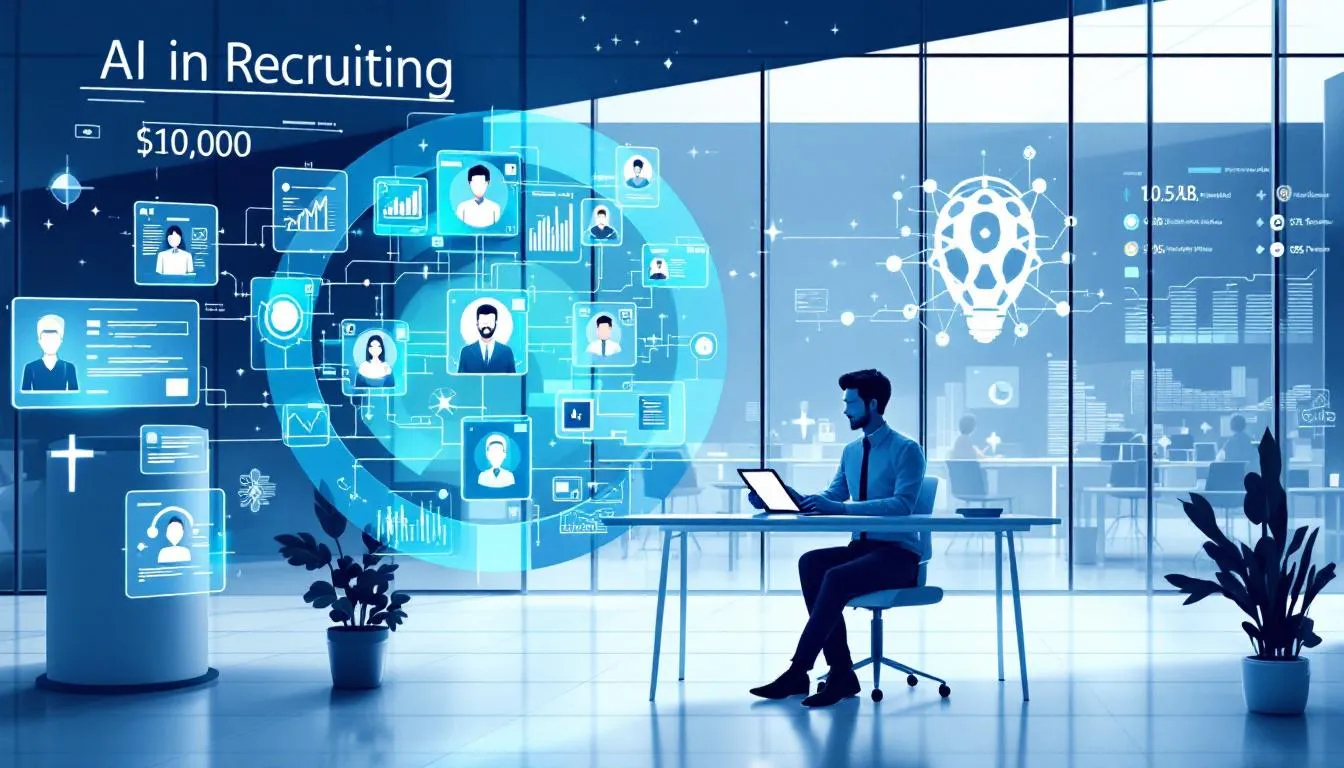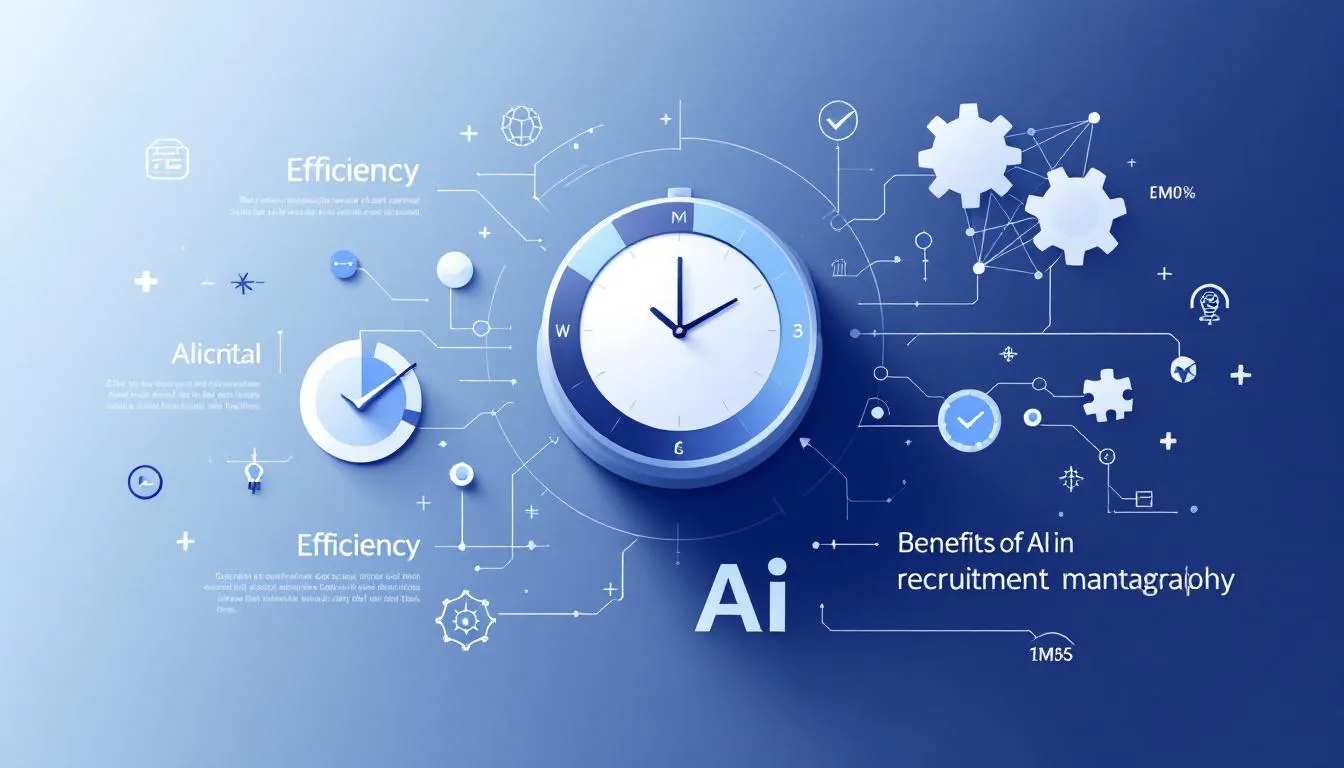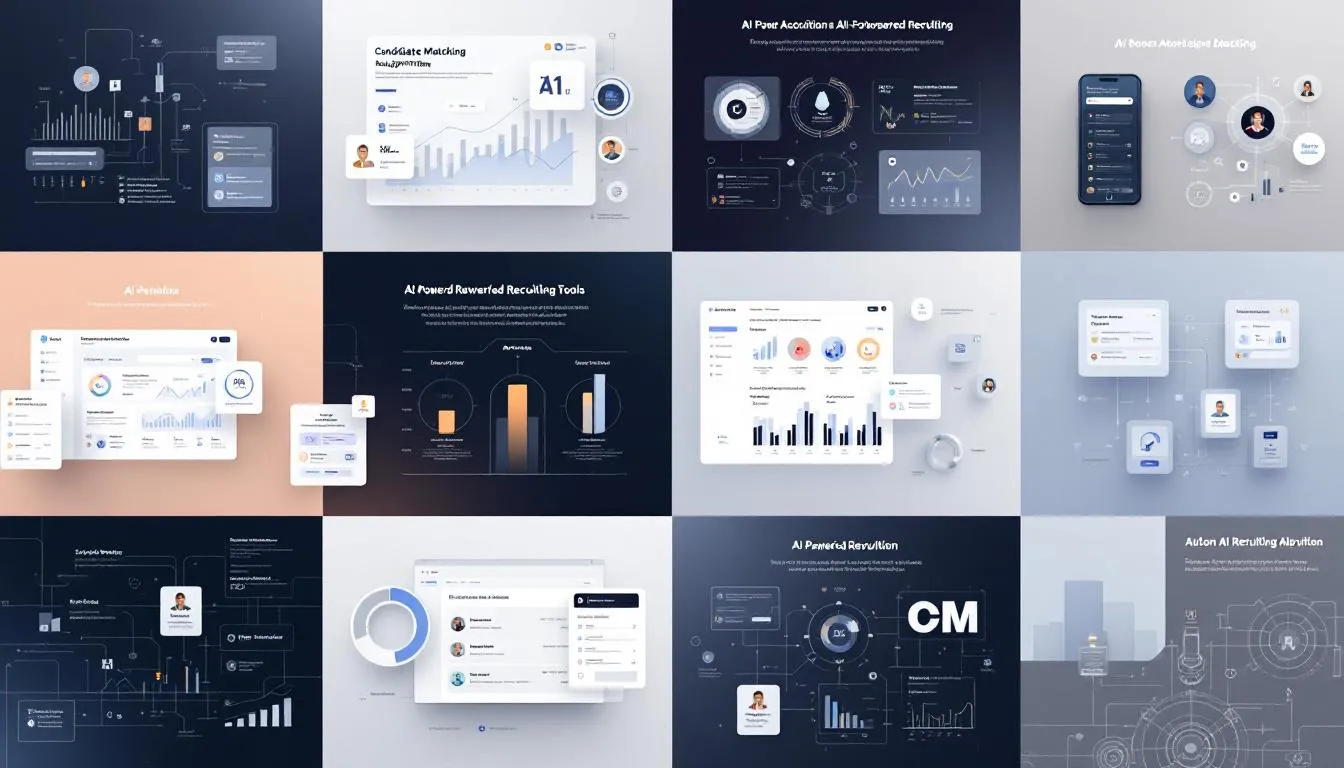AI in Recruiting 2025: Best Practices to Optimize Your Hiring Process
AI in recruiting is transforming how companies hire by automating repetitive tasks, improving candidate matching, and minimizing bias.
This article delves into the ways AI can streamline your recruitment process, enhance efficiency, and lead to better hiring decisions.
Key Takeaways
- AI optimizes recruitment by automating repetitive tasks, enhancing efficiency, and enabling human recruiters to focus on strategic initiatives.
- AI-driven tools significantly improve candidate matching and reduce bias in hiring processes through objective evaluations based on skills and experiences.
- Ethical considerations and proper data protection measures are essential to mitigate algorithmic bias and ensure transparency in AI-driven recruitment practices.
Understanding AI in Recruiting

Artificial intelligence optimizes talent acquisition ai by analyzing data objectively, enhancing efficiency, and automating repetitive tasks. As AI automates manual tasks, it allows human recruiters to focus on strategic initiatives, enhancing their job performance and decision-making speed.
The integration of AI in recruitment empowers hiring managers to process large data sets accurately and efficiently, ultimately leading to quicker and more effective hiring processes.
What is AI in Recruiting?
AI in recruiting refers to the application of artificial intelligence to streamline hiring processes by utilizing algorithms, data analytics, and call analytics. This technology automates repetitive tasks such as:
- Writing job descriptions
- Answering candidate queries
- Scheduling interviews These automations significantly reduce the administrative workload for HR teams.
AI enhances candidate matching through data analysis, ensuring candidates are better aligned with job requirements and improving overall fit; AI recruitment software automates this matching.
Difference Between AI and Machine Learning
Artificial intelligence encompasses systems designed to perform tasks that typically require human-like intelligence, such as problem-solving and understanding. Machine learning is a subset of AI. It focuses on pattern recognition and predictions, enabling AI systems to learn from data and enhance their performance over time.
While AI aims to replicate human-like behaviors, machine learning enables these systems to adapt based on new data, making them increasingly effective in the recruitment process.
Benefits of AI in the Recruitment Process

Adopting AI in recruitment can lead to significant hiring costs savings and increased efficiency. Companies utilizing AI have reported improvements in efficiency and candidate experiences, as AI technologies automate mundane tasks and allow organizations to focus on strategic engagement with candidates through tools like an AI interview process.
AI-driven talent acquisition process can reduce the time required to find, assess, and hire the best talent, ensuring a smoother hiring journey for job seekers.
Automation of Repetitive Tasks
AI automates résumé screening and hiring processes by:
- Matching candidates to open roles effectively.
- Scanning applications for keywords to quickly identify relevant candidates.
- Coordinating interviews through integrated chatbots and calendar functionalities.
This automation massively reduces the time-consuming administrative tasks involved in the hiring process, also when hiring virtual assistants.
Streamlining these manual processes enables human recruiters to focus on higher-value activities, cutting recruiting process costs and enhance efficiency overall.
Enhanced Candidate Matching
AI-powered tools have matching and scoring capabilities that automatically identify best-fit candidates by analyzing large datasets to find correlations between candidates and job success.
These AI tool rely on reliable and clean, structured data to recognize patterns and provide real insights into candidate matching, ensuring that the most qualified candidates are selected.
As AI advancements continue, the accuracy of predicting candidate experience, success, and cultural fit during the hiring process will only improve.
Bias Reduction
AI significantly reduces unconscious bias in hiring by:
- Focusing on job-related criteria rather than personal factors.
- Not starting with inherent biases, ensuring more objective evaluations based on candidates’ skills and experiences.
- Screening candidates based on skills and assessments instead of demographics, further promoting fair and inclusive hiring practices.
Effective bias reduction requires AI systems to be built with rigorous objective training data.
Popular AI Recruiting Tools

AI recruiting tools are designed to streamline candidate sourcing and enhance hiring decisions through automation, integrating ai tools that help formulate job ads that attract a wider pool of potential applicants and include features like personalized job recommendations, intelligent search, and chatbots.
Recruitment tools, including recruiting software and ai recruiting software, that utilize these advancements can significantly improve the hiring process. Additionally, ai recruitment tools can further optimize these efforts.
Examples of popular AI tools in recruitment include Oleeo, which enhances candidate engagement, and resume parsers that improve screening efficiency.
Resume Screening Software
AI-powered resume screening tools offer several advantages:
- They can analyze and categorize resumes based on qualifications like skills and experience, improving screening efficiency.
- Tools utilizing natural language processing technology enhance the accuracy of resume keyword matches.
- They help recruiters identify top candidates more effectively.
By automating the resume screening process, AI enables recruiters to focus on more strategic tasks, improving overall productivity.
Chatbots for Candidate Interaction
Chatbots in recruitment automate workflows and mimic human conversation, facilitating communication with candidates.
These AI-driven chatbots enhance candidate engagement by:
- Handling initial interactions
- Addressing FAQs
- Scheduling interviews
- Providing instant feedback.
Chatbots assist candidates during the application process, ensuring a smoother and more engaging experience.
Predictive Analytics
Predictive analytics in recruiting utilizes advanced algorithms to analyze data and forecast candidate success. These tools evaluate historical data, job performance indicators, and other relevant metrics to make predictions about a candidate’s potential success and retention within a company.
Employing predictive analytics enables organizations to make more informed hiring decisions, enhancing retention rates and overall employee satisfaction.
To support these AI tools with accurate, up-to-date external data (e.g. scraping job boards, social media, market intelligence), you may also need a robust proxy / data access layer. For that, services like mobile proxies can help ensure your systems can gather web data reliably — rotating IPs, avoiding CAPTCHAs, and targeting geo-specific locations.
How AI is Transforming the Recruitment Process

A significant number of companies plan to adopt AI technology to remain competitive, utilizing AI to analyze recruitment data and support decision-making processes. AI tools such as Humanly’s chatbot and Paradox’s AI assistant, Olivia, streamline the hiring process by efficiently managing candidate interactions and scheduling.
Fetcher, recognized for automating candidate sourcing and outreach, ensures a consistent flow of qualified candidates while guiding candidates from the candidate pool to ensure everyone is on the same page.
Proactive Talent Sourcing
AI technologies facilitate proactive sourcing by analyzing data to identify passive candidates and assemble talent pools. Through predictive analytics, organizations can identify suitable candidates even before job openings arise, fostering a dynamic and adaptable workforce.
Combining proactive sourcing with internal talent development, AI improves employee retention and overall workforce agility.
Improved Decision-Making
Utilizing AI helps organizations make more informed hiring decisions by analyzing historical recruitment data.
Predictive analytics in recruitment can:
- Forecast candidate success
- Assess cultural fit and performance potential
- Suggest upskilling areas These capabilities enhance decision-making in recruitment.
Data-driven insights offered by AI optimize performance and provide coaching opportunities for the interview questions team.
Streamlined Onboarding
AI can streamline the onboarding process by automating paperwork and initial training tasks. This technology expedites onboarding by providing personalized training experiences, ensuring a smooth transition for new hires into the company.
The integration of AI in onboarding leads to increased efficiency and a more engaging experience for new employees.
Challenges and Ethical Considerations
AI in recruiting may perpetuate biases present in training data, leading to unfair hiring outcomes. Mishandling sensitive candidate information can lead to significant privacy issues, highlighting the need for proper data protection measures.
Organizations must focus on transparency in AI decision-making and ensure accountability for outcomes, adhering to anti-discrimination laws to protect candidate rights.
Data Privacy Concerns
Proper data protection measures are crucial when utilizing AI for storing candidate information. Organizations must secure candidate consent for using AI technologies that analyze personal data, ensuring privacy and building trust in the recruitment process. Additionally, using a secure VPN can further safeguard sensitive candidate data during transmission, preventing unauthorized access and ensuring compliance with privacy regulations.
Potential for Algorithmic Bias
AI systems can unintentionally perpetuate human biases found in their training data, making regular audits essential. Input data must be free from discrimination against protected groups to ensure fairness.
Regularly auditing AI tools helps identify and mitigate inherent biases, promoting more equitable hiring practices.
Transparency and Accountability
A significant number of Americans are unaware that organizations use AI in their hiring process, highlighting a transparency gap. HR teams must ensure accountability by double-checking AI-generated suggestions before proceeding, providing human oversight and transparency in AI decision-making processes to build trust with candidates and stakeholders.
Best Practices for Integrating AI into Your Recruitment Strategy
A strategic approach is necessary for successful integration of responsible ai into recruitment processes. Constant assessment and reviews are required, along with clearly defined ethical guidelines for AI use in hiring.
Organizations should use tools like the Talent Experience Engine to optimize recruitment marketing and follow playbooks provided by SHRM for implementing AI in recruitment.
Assess Current Processes
Organizations should evaluate existing recruitment efforts practices to determine where AI can add the most value. Identifying specific pain points in recruitment workflows, such as time-consuming tasks and administrative burdens, allows companies to target AI implementation more effectively.
This assessment helps ensure that AI tools are applied in the areas where they can have the greatest impact, enhancing overall recruitment efficiency.
Choose the Right AI Tools
Selecting the right AI tools involves collaboration between the executive team, IT, and HR to align with business objectives. Evaluating both free and premium AI solutions according to organizational needs and budget constraints is essential for successful AI implementation.
By choosing AI tools that address specific recruitment challenges, organizations can optimize their talent acquisition processes and improve hiring outcomes.
Train HR Teams
Training HR teams on AI tools is vital to enhance their ability to leverage these technologies effectively. Regular training sessions boost HR professionals’ confidence in utilizing AI technologies, ensuring they are well-equipped to integrate AI into the recruitment process.
Ongoing training for HR teams enhances their proficiency, leading to improved recruitment results and a more efficient hiring process for hiring teams.
Examples of Successful AI Implementation in Recruiting
Companies like Unilever and IBM have successfully integrated AI into their recruitment processes, demonstrating the transformative potential of AI in hiring.
These organizations have utilized AI to enhance candidate screening, improve engagement, and streamline hiring decisions, providing valuable insights for other companies looking to adopt AI in recruitment.
Case Study: Unilever
Unilever leverages HireVue’s tool to score candidates’ spoken words during the interview process, enhancing their recruitment process by incorporating AI to streamline candidate screening.
By integrating AI technologies, Unilever has improved the accuracy of predicting candidate fit, leading to better recruitment decisions and overall hiring outcomes.
Case Study: IBM
IBM has strategically integrated AI into its talent acquisition to enhance the recruitment process, utilizing AI-driven tools to improve candidate engagement and streamline hiring decisions. The implementation of AI has resulted in quicker hiring decisions and improved candidate engagement, showcasing the benefits of AI in recruitment.
The Future of AI in Recruiting

Emerging AI technologies, particularly generative AI, are set to revolutionize the recruitment landscape. As language models improve, AI will become more powerful and integrated into hiring practices, enhancing candidate experiences and optimizing recruitment strategies.
Organizations can stay updated on AI recruiting trends by attending industry conferences and engaging with thought leaders, ensuring they remain at the forefront of AI adoption in recruitment.
Rise of Generative AI
Generative AI can automate the creation of job descriptions and messages, enhancing recruiter efficiency by generating tailored job description that ensure clarity and inclusivity. Unlike traditional AI systems that primarily analyze data, generative AI creates content aligned with business goals, providing a new dimension to AI in recruitment.
AI-Driven Internal Mobility
AI in workforce management offers several benefits:
- Identifies and promotes existing employees for new roles, reducing the need for external hiring and improving retention.
- Analyzes job descriptions to identify biases that may impede internal mobility.
- Enhances workforce agility.
- Ensures a more dynamic and adaptable workforce.
Enhanced Predictive Capabilities
Predictive analytics is a powerful tool in recruitment that leverages historical data to forecast future hiring outcomes, allowing recruiters to determine which candidates are likely to be successful in specific roles. Improved accuracy in predicting candidate fit leads to more informed hiring decisions, better employee retention, and enhanced performance, making predictive analytics an invaluable asset in modern recruitment.
Summary
In summary, AI is revolutionizing the recruitment process by enhancing efficiency, improving candidate matching, and reducing biases. The adoption of AI recruiting tools allows organizations to automate repetitive tasks, focus on strategic initiatives, and make more informed hiring decisions. Successful implementations by companies like Unilever and IBM highlight the transformative potential of AI in recruitment.
As AI technologies continue to evolve, the future of recruitment looks promising with the rise of generative AI, AI-driven internal mobility, and enhanced predictive capabilities. By staying updated on AI trends and integrating AI tools effectively, organizations can optimize their hiring processes and remain competitive in the talent acquisition landscape.
Embrace the power of AI in recruitment to stay ahead of the curve and create a more efficient, fair, and engaging hiring process. The future of talent acquisition is here, and it’s powered by AI.
Frequently Asked Questions
1. How does AI improve the recruitment process?
AI enhances the recruitment process by automating repetitive tasks, improving candidate matching, and minimizing biases. This enables recruiters to concentrate on strategic initiatives and make better-informed hiring decisions.
2. What are some popular AI recruiting tools?
Some popular AI recruiting tools are Oleeo, Phenom AI, and Paradox's Olivia, which assist in resume screening, candidate interaction, and predictive analytics. These tools can significantly enhance your recruiting process.
3. How does AI reduce unconscious bias in hiring?
AI effectively reduces unconscious bias in hiring by concentrating on job-related criteria and evaluating candidates based on their skills and experiences. This objectivity is enhanced through regular audits and the use of unbiased training data.
4. What are the ethical considerations of using AI in recruitment?
The ethical considerations of using AI in recruitment predominantly revolve around data privacy, the risk of algorithmic bias, and the necessity for transparency and accountability. Adhering to anti-discrimination laws and implementing stringent data protection measures is essential for organizations.
5. How can organizations integrate AI into their recruitment strategy?
Integrating AI into your recruitment strategy requires a careful assessment of current processes, selection of appropriate AI tools, and adequate training for HR teams. A strategic and ongoing evaluation of these elements is essential for effective implementation.



